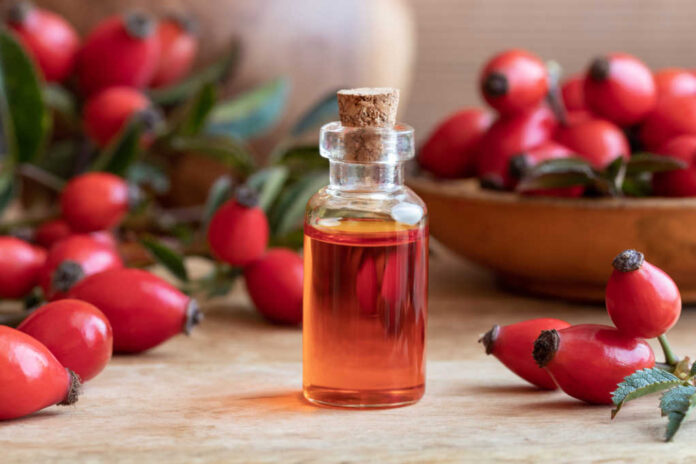
After the flowers of rose bushes are pollinated and fade away, they leave behind small, fleshy fruits called rose hips.
Most roses are prized for their beautiful and sensuous flowers, but some varieties, such as the dog rose (Rosa canina), are grown for their hips. The fruit and seeds from the dog rose hips are commonly pressed into the oil with a wide range of applications.
Rosehip oil is not generally recommended for eating or cooking, but applying it topically can offer several benefits for your skin.
Restoring, Moisturizing, and Hydrating Your Skin
Rosehip oil is an excellent source of fatty acids, including linoleic acid and linolenic acid, and antioxidants like vitamin A, which are necessary for the production of healthy skin cells.
Rosehip oil moisturizes your skin, restoring your skin barrier and helping it retain moisture. This can help keep your skin hydrated, glowing, and looking its best.
Healing and Protecting Against Damage
Rosehip oil can help heal damage to your skin, such as sun damage, scars, wrinkles, stretch marks, and fine lines.
This is likely due to its high concentrations of vitamins C, A, and E, which are necessary for collagen production and reducing inflammation.
Collagen is a protein that gives your skin its structure and elasticity. Your skin produces less collagen as you get older, leading to the sagginess and wrinkles we associate with old age.
Antioxidant, Anticancer, and Antimicrobial Properties
The antioxidants in rosehip oil can help protect your skin against damage from the sun, pollution, and other environmental factors.
These antioxidants also appear to have anticancer and antiproliferative properties. This does not mean that roses cure cancer, but rosa Canina extracts may be a safe and effective addition to managing and treating some types of cancer.
Rosehip can help to protect your skin against infection and inflammation. Some of the compounds in rosa canina have antibacterial and antimicrobial properties that can help eliminate bacteria such as E. Coli and Staphylococcus aureus.
Applying Rosehip Oil to Your Skin
When trying out a new skincare product, it’s always best to do a patch test first to make sure you’re not allergic.
To perform a patch test, apply a small amount of the oil to a small area of your skin, such as your wrist or inner elbow.
If it feels irritated or itchy, or if you develop a rash, redness, swelling, or any other reaction, wash the area with soap and water and discontinue use.
If you don’t have any reaction, you can apply the oil on its own or add a few drops to your favorite lotion.
Store it in a cool, dark place to prevent it from going rancid.
Rosehip oil can be a great addition to your skincare routine, but it’s not a magic cure-all. Follow the directions on the label, and if you have any concerns, talk to your doctor.






















